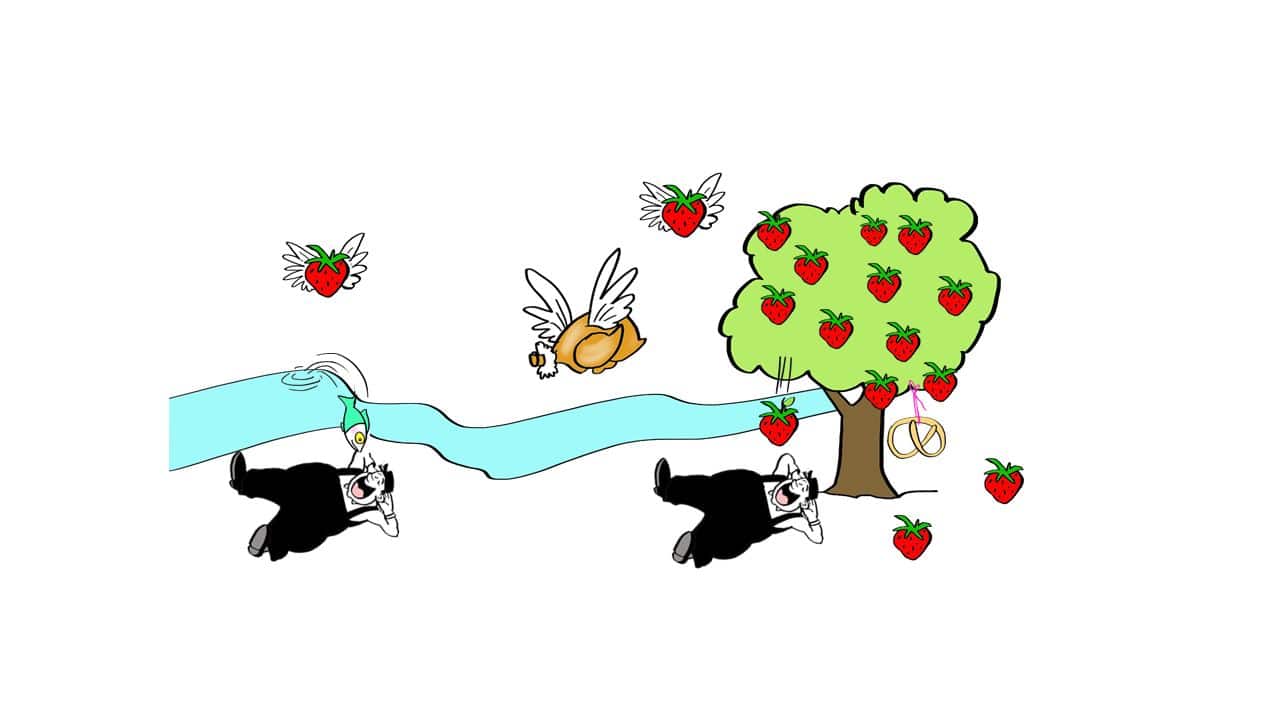For modern societies, the story of Schlauraffen land is apparently far less fascinating, because we are no longer persistently hungry and thirsty. Does that mean that the dream has come true and that we actually live in Schlauraffen land today? We asked a few friends and colleagues. No one thought that they were living in Schlauraffen land, even though we are “damn well off” when compared to the Middle Ages or poorer developing countries. People in western countries today are not really plagued by hunger or thirst. Furthermore, we certainly we do not long to eat three times more than we do on a daily basis. Of course, it would be spectacular if the fried chicken would fly into our mouths; but honestly, the charm would vanish very quickly.
So, what does it actually mean that we do not have the impression that we live in Schlauraffen land, even though we are doing so well? The answer to this question provides a fundamental insight into the basic economic problems of a society. First, think about what distinguishes your life from life in the story of Schlauraffen land…
How do economists see the difference between our wealthly modern life and life in Schlauraffen land?
In our own lives (almost?) each and every one of us has unfulfilled desires. That’s why we aren’t living in Schlauraffen land! Unfulfilled desires lead us to what economists call the principle of scarcity.
It would be nice to have a lot more free time and more time for hobbies, family and maybe even more time to study. At the same time, however, this means working less and accepting a lower income. We therefore have to do without other things that we “want” too! In the example above, time is limited and that forces us to make decisions and weigh what matters to us. In the language of economists, time is an example of a scarce resource. Even income and wealth are scarce resources for most of us. Who doesn’t have the dream of buying something that they could only afford if they did without something else? Maybe that Ferrari comes at the expense of a beautiful condominium in the green outskirts of city X. Or, if you are like us and a Ferrari is not that important to you, then there is certainly something else that could stand in its place. Perhaps a particularly good private school for your children… So we permanently have a scarcity of resources such as time and income or wealth and we must make annoying decisions that are based on trade-offs.
More of one means less of the other: in short, this is the maxim for those who don’t live in Schlauraffen land. They are damned to evaluation and prioritization. What applies to particular individuals, also applies to entire societies. It would be nice to guarantee all members of society a generous standard of living, the best education, the best medical care and the best culture on top of all that. In Schlauraffen land, all this would have happened with the blink of an eye. Nobody has less there because another has more. Schlauraffen land is perfectly egalitarian! No country is more fair than Schlauraffen land! Would that really make us happy though? We would have no visions or goals to put our efforts towards accomplishing. We would no longer have the opportunity to compare and anchor ourselves socially. We would probably lose the meaning of life.
Let’s go back to the world outside of Schlauraffen land. Here you cannot avoid annoying considerations. More income support for those who earn a below-average income in a modern market economy means more taxes for those with a high income and more people in the state administration who are performing the reallocation (including more control over tax evasion). Once again we are forced to make decisions as a society.
Economics is the study of exactly these considerations. On the one hand, it examines how people make such decisions. On the other hand, it tries to help any considerations rational. With that an important technical word emerges: Economists call these decisions tradeoffs. So, economics is the science of rational tradeoffs. Individuals, companies, societies: They all have to face the tradeoffs, which are indispensable due to scarce resources!
However, this is perhaps a somewhat complicated explanation of economics. The picture of Schlauraffen land makes this much more vivid: Economics is the science that deals with how to survive outside of Schlauraffen land. In the universities of Schlauraffen land, there may be German studies, as well as departments of philosophical and film studies, but there is no department of economics!
More about the economy outside of Schlauraffen land, in a following post. Did the post encourage you to think? Or not enough? Then here a little more material … You meet a person who does not care about material wealth. Apart from their basic needs. The person may be engaged in spiritual things, doing yoga, or being very religious, and being deeply involved in the church. Does that mean that this person does not have to make economic tradeoffs? Does this person live in Schlaraffen land?
About the author(s)

Prof. Dr. Johannes Binswanger Professor of Economics
Relevant executive education
Newsletter
Get the latest articles directly to your inbox.
Share article
More articles
The Future of Work and the Central Role of Diversity & Inclusion
Leadership in Transition: Five Trends of Modern Leadership
The future of work – also relevant for the legal market?
Why inclusive leadership matters for every generation
Do young lawyers need leadership, too? Classification according to generations – slightly arbitrary, but useful

